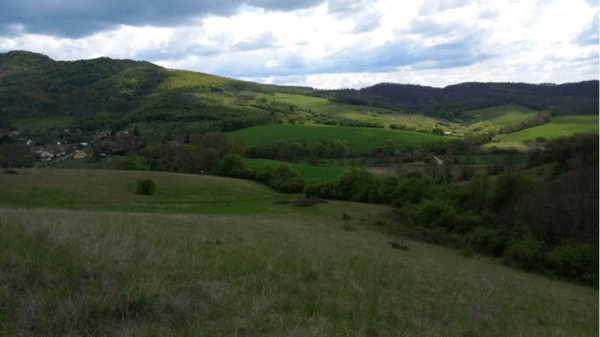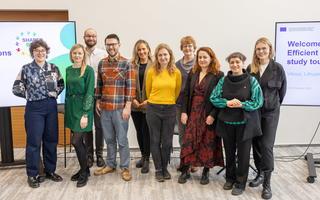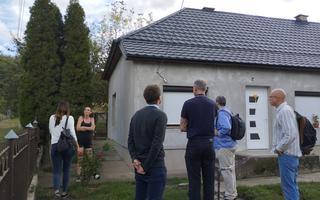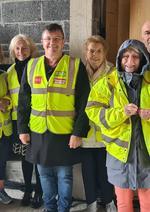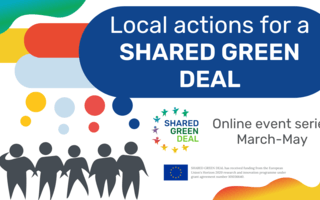Green Homes in Nógrád
Summary of the local experiment
The experiment in Nógrád, Hungary, aimed to address the available technical, social, and community solutions tailored to the renovation needs of low-income households in a rural residential area. The valuable field experience of HfHH was to be shared along with know-how and experiences from energy experts and constructors in the network during meetings and ecotours with participants.
Local context
Nógrád is Hungary's second smallest county, located northeast of Budapest, on the Slovak border. Most of its territory is a hilly, heavily wooded landscape dominated by villages, many with a population of less than 1,000 inhabitants. Energy-substandard detached houses dominate the area. A significant proportion of the population lacks energy efficiency and financial awareness. In the region, energy poverty is a complex phenomenon with strong social aspects that must be addressed simultaneously to achieve positive results.
Specific needs and challenges
Energy poverty is a common phenomenon within the locality; it is a complex issue with strong social aspects that must be addressed simultaneously to achieve positive results. Houses are generally in poor condition, with problems to be solved before the actual energy renovation can happen. The majority of properties are heated by wood, and 45% use individual space heating (stoves). Households have generally low income, often combined with modest financial awareness. Under such housing and social conditions, assessing cost-effective options for energy efficiency renovations is a priority. Therefore, the different options, motivations, good experiences, challenges and obstacles to energy renovations need to and will be assessed in a broader sense within the social experiment, as well as technical solutions specific to the given housing conditions will also need to be addressed.
Detailed description of the experiment
Given the region's high level of energy poverty and HfHH’s field experience, the project aimed to address available technical, financial, social and community solutions tailored to the renovation needs of low-income households. The professional members of the knowledge network were selected and invited to serve this aim of inclusion, to tackle the complex technical, financial, social and community implications of renovations.
The best way to trigger action and promote energy renovations among local households is to showcase tangible implementation. Here the neighbourhood effect is the perfect incentive. The eco-home tours sought to demonstrate and disseminate the feasibility and benefits of energy renovations. Specificities to the local housing conditions (how to insulate mixed masonry buildings, what options are available to change the inefficient wood-fueled stoves to improve heating conditions and how the energy consumption can be reduced) were to be targeted.
For the experiment, it is not only important to show good practices and what works for households. It is at least as essential to bring together different actors and to raise awareness of the energy poverty phenomenon with the professional audience (mainly local authorities and organizations working in various fields) to reflect together on how to help local energy efficiency retrofits in residential buildings at the system level and to find possible solutions to the problems and challenges.
Involvement of the target group
The main target group of the social experiment were families, as they are eligible for the state renovation grant, but the project was not be exclusive. HfHH’s Rural Assist Programme (RAP) targets 25 households where energy renovations have been and will be carried out. The social experiment sought to scale up the initiative by involving more households and stakeholders within the region.
In addition to households, the knowledge network would target the following stakeholders:
- At least 15 professionals will be selected based on their role in energy renovations and their relation to residents.
- Local civil organizations will play a key role in engaging citizens, incorporating the social dimensions and mapping challenges of home energy renovation.
- The network will involve technical experts (constructors, energy specialists), mainly local SMEs with experience in energy performance assessment and home renovation in the region.
- At least one financial institution will join the network (possibly Erste Bank), and independent advisors who can provide information on financial options.
- Additional stakeholders to involve may include experts in adult education and group facilitation.
Partners
Habitat for Humanity works in 70 countries worldwide to ensure everyone can live in a healthy, affordable, dignified home. Habitat for Humanity Hungary has built more than 150 houses, renovated nearly 800 homes, and provided technical advice to improve the housing of 700 families. Since 2016, when it was established, the organization has been one of the strongest and most credible voices on the topic of energy poverty in Hungary and with the increased attention to and urgency of the climate crisis.
Additional remarks
The financial awareness of the target group (families) is below average. Thus, households often need to be made aware of and capable of accessing available support. Activities would therefore pay special attention to financing, with experts from the network providing information. Other forms of technical assistance beyond finance were also to be explored, including the role of local authorities and NGOs.
Local partner
Habitat for Humanity Magyarország Alapítvány (HfHH)
Country
Hungary
Number of inhabitants
190,000
City
Nógrád County
Website/social media
Contact person:
Zsuzsanna Koritár, Policy expertzsuzsanna [dot] koritar [at] habitat [dot] hu
May/June 2023
Recruitment of the knowledge network
Late June 2023
First event for knowledge network (Stage 1)
Summer-Autumn 2023
Eco-home tours: pre-renovation and post-renovation visits
Feb-Mar 2024
Reaching out and scaling up stage
Apr-Early May 2024
Reflections and next steps: Discussion of renovation toolkit
Related Green Deal Priorities
TIMELINE
Case Study Guides
|
Find out more


CONTACT
For further details please contact co-leads Professor Chris Foulds (chris.foulds@aru.ac.uk) and Professor Rosie Robison (rosie.robison@aru.ac.uk).

This project has received funding from the European Union’s Horizon 2020 research and innovation program under grant agreement No 101036640. The sole responsibility for the content of this website lies with the SHARED GREEN DEAL HAS project and does not necessarily reflect the opinion of the European Union.
